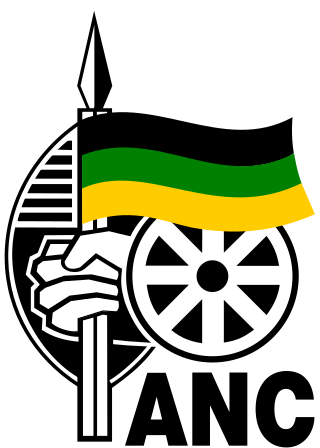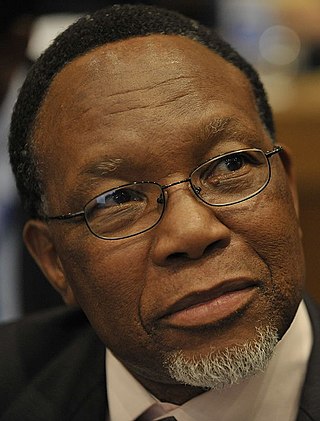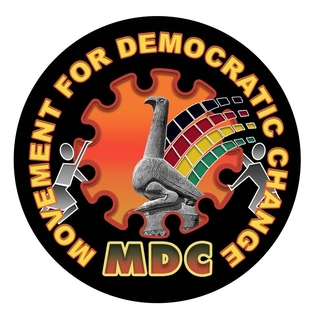
The African National Congress (ANC) is a social-democratic political party in South Africa. A liberation movement known for its opposition to apartheid, it has governed the country since 1994, when the first post-apartheid election resulted in Nelson Mandela being elected as President of South Africa. Cyril Ramaphosa, the incumbent national President, has served as President of the ANC since 18 December 2017.

Thabo Mvuyelwa Mbeki is a South African politician who served as the second president of South Africa from 14 June 1999 to 24 September 2008, when he resigned at the request of his party, the African National Congress (ANC). Before that, he was deputy president under Nelson Mandela from 1994 to 1999.

The South African Communist Party (SACP) is a communist party in South Africa. It was founded in 1921 as the Communist Party of South Africa (CPSA), tactically dissolved itself in 1950 in the face of being declared illegal by the governing National Party under the Suppression of Communism Act, 1950. The Communist Party was reconstituted underground and re-launched as the SACP in 1953, participating in the struggle to end the apartheid system. It is a member of the ruling Tripartite Alliance alongside the African National Congress and the Congress of South African Trade Unions (COSATU) and through this it influences the South African government. The party's Central Committee is the party's highest decision-making structure.

The president of South Africa is the head of state and head of government of the Republic of South Africa. The president directs the executive branch of the federal government and is the commander-in-chief of the South African National Defence Force. Between 1961 and 1994, the office of head of state was the state presidency.

The United Democratic Movement (UDM) is a centre-left, social-democratic, South African political party, formed by a prominent former National Party leader, Roelf Meyer, a former African National Congress and Transkei homeland leader, General Bantu Holomisa, and a former ANC Executive Committee member, John Taylor. It has an anti-separatist, pro-diversity platform; and supports an individualist South Africa with a strong moral sense, in both social and economic senses.

The Treatment Action Campaign (TAC) is a South African HIV/AIDS activist organisation which was co-founded by the HIV-positive activist Zackie Achmat in 1998. TAC is rooted in the experiences, direct action tactics and anti-apartheid background of its founder. TAC has been credited with forcing the reluctant government of former South African President Thabo Mbeki to begin making antiretroviral drugs available to South Africans.
The following lists events that happened during 2003 in South Africa.

Mosiuoa Gerard Patrick Lekota is a South African anti-Apartheid revolutionary for the African National Congress (ANC) who served jail time with Nelson Mandela from 1985 and who left the ANC to form the Congress of the People (Cope) splinter party in 2008. He is serving as its President since 16 December 2008.

Angela Thokozile Didiza is a South African politician who is currently serving as Minister of Agriculture, Land Reform and Rural Development since May 2019. A member of the African National Congress (ANC), she was the Minister of Agriculture and Land Affairs from June 1999 to May 2006 and Minister of Public Works from May 2006 to September 2008.
William Mothipa Madisha is a South African trade unionist and politician. Madisha is the former President of both the Congress of South African Trade Unions and the South African Democratic Teachers Union . Madisha grew up in Atteridgeville, Pretoria, South Africa, where he was a member of the United Democratic Front. He studied teaching at Transvaal College of Education.
Aziz Goolam Hoosein Pahad was a South African politician and anti-apartheid activist who was Deputy Minister of Foreign Affairs from 1994 to 2008. He was a member of the National Executive Committee of the African National Congress from 1985 to 2007.

Kgalema Petrus Motlanthe is a South African politician who served as the third president of South Africa from 25 September 2008 to 9 May 2009, following the resignation of Thabo Mbeki. Thereafter, he was deputy president under Jacob Zuma from 9 May 2009 to 26 May 2014.

South Africa since 1994 transitioned from the system of apartheid to one of majority rule. The election of 1994 resulted in a change in government with the African National Congress (ANC) coming to power. The ANC retained power after subsequent elections in 1999, 2004, 2009, 2014, and 2019. Children born during this period are known as the born-free generation, and those aged eighteen or older, were able to vote for the first time in 2014.
Joel Netshitenzhe is a South African politician and strategist, known for his policy and communications work for the African National Congress (ANC). He served as head of communications under President Nelson Mandela (1994); head of Government Communication and Information System (1998–2006); and head of the policy unit in the Presidency (2001–2009) under Presidents Thabo Mbeki and Jacob Zuma, though he was viewed as a particularly close ally of Mbeki's. A former anti-apartheid activist, Netshitenzhe was a member of the ANC National Executive Committee between 1991 and 2022, and he was a member of the ANC's delegation to the negotiations that ended apartheid.
The 52nd National Conference of the African National Congress (ANC) was held in Polokwane, Limpopo, from 16 to 20 December 2007. At the conference, Jacob Zuma and his supporters were elected to the party's top leadership and National Executive Committee (NEC), dealing a significant defeat to national President Thabo Mbeki, who had sought a third term in the ANC presidency. The conference was a precursor to the general election of 2009, which the ANC was extremely likely to win and which did indeed lead to Zuma's ascension to the presidency of South Africa. Mbeki was prohibited from serving a third term as national President but, if re-elected ANC President, could likely have leveraged that office to select his successor.

The Movement for Democratic Change – Tsvangirai (MDC–T) is a centre-left political party and was the main opposition party in the House of Assembly of Zimbabwe ahead of the 2018 elections. After the split of the original Movement for Democratic Change in 2005, the MDC–T remained the major opposition faction, while a smaller faction, the Movement for Democratic Change – Ncube, or MDC–N, was led by Welshman Ncube.

The African National Congress (ANC) has been the governing party of the Republic of South Africa since 1994. The ANC was founded on 8 January 1912 in Bloemfontein and is the oldest liberation movement in Africa.

The Congress of the People (COPE) is a South African political party formed in 2008 by former members of the African National Congress (ANC). The party was founded by former ANC members Mosiuoa Lekota, Mbhazima Shilowa and Mluleki George to contest the 2009 general election. The party was announced following a national convention held in Sandton on 1 November 2008, and was founded at a congress held in Bloemfontein on 16 December 2008. The name echoes the 1955 Congress of the People at which the Freedom Charter was adopted by the ANC and other parties, a name strongly contested by the ANC in a legal move dismissed by the Pretoria High Court.
In South Africa, HIV/AIDS denialism had a significant impact on public health policy from 1999 to 2008, during the presidency of Thabo Mbeki. Mbeki criticized the scientific consensus that HIV is the cause of AIDS beginning shortly after his election to the presidency. In 2000, he organized a Presidential Advisory Panel regarding HIV/AIDS including several scientists who denied that HIV caused AIDS.
The Provincial Executive Committees (PECs) of the African National Congress (ANC) are the chief executive organs of the party's nine provincial branches. Comprising the so-called “Top Five” provincial officials and up to 30 additional elected members, each is structured similarly to the party's National Executive Committee (NEC) and is elected every four years at party provincial conferences.












